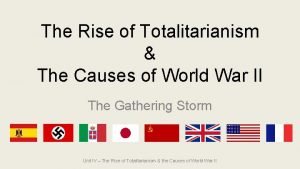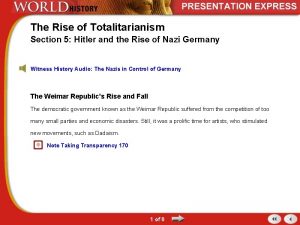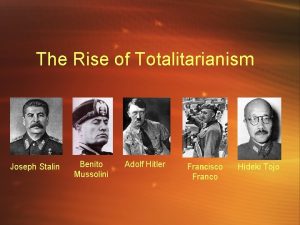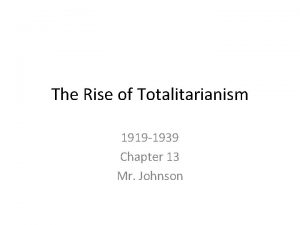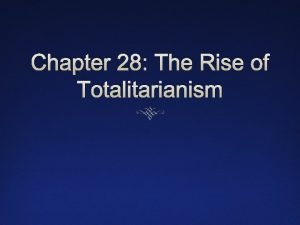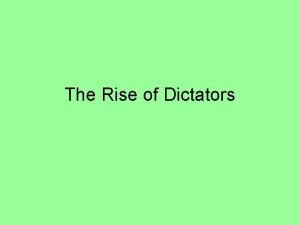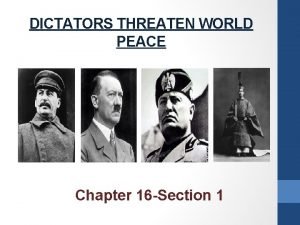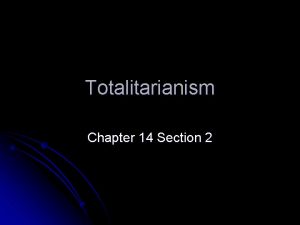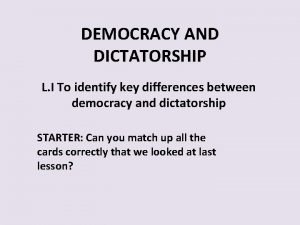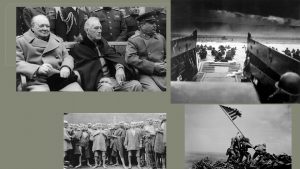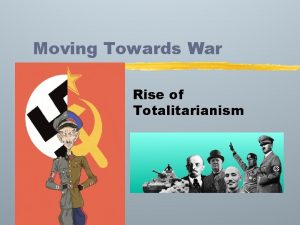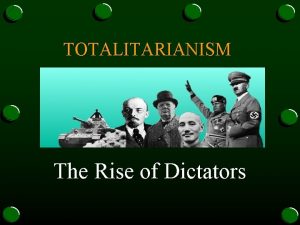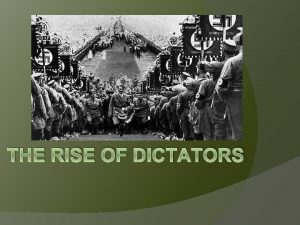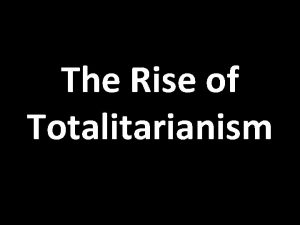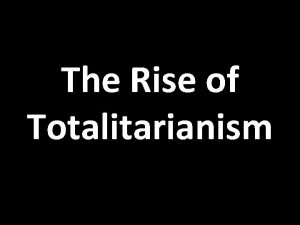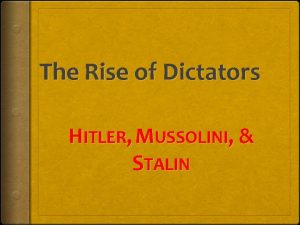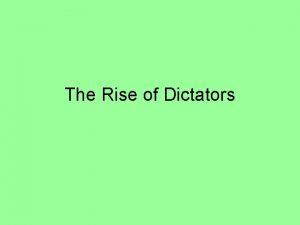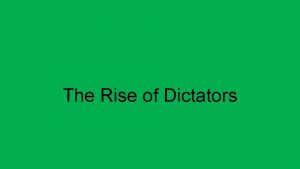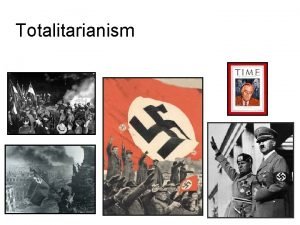Totalitarianism The Rise of Dictators General Causes of




























- Slides: 28

Totalitarianism: The Rise of Dictators

General Causes of Totalitarianism § Political and Economic Conditions in Post-War Europe § The idea came from the concept of Total War in which all citizens worked for the war effort § World wide economic depression § Lack of Political Leadership

Political Leadership in Europe § Most of the new Republics of Europe were not meeting the economic and social needs of their people § Weimar Republic of Germany could not deal with inflation in the German economy § The Italian Social Republic had no political power against political revolutionaries § New radical leaders began to emerge out of the rubble of Post-WWI Europe § Adolf Hitler and Nazism in Germany § Benito Mussolini and Fascism in Italy



The Rise of Nazi Germany § Adolf Hitler was a soldier in World War I and resented to Versailles peace settlements § In 1920, Hitler joined the small Nazi Party and became its leader the next year. § A master orator, he gained support of the German people through nationalism, anti-semitism, anticommunism, and charisma § Hitler’s ultimate goal was to create Lebensraum, living space for German speaking people

The Rise of Nazi Germany § Hitler was appointed Chancellor of Germany in 1933 § Hitler quickly established a totalitarian state in Germany § He quickly began pursuing the following policies which were against the Treaty of Versailles 1. 2. 3. 4. Rebuilding the German military Expanding into the lands lost after WWI Issuing anti-semitic laws against Jews within Germany Pursuing alliances with other major countries









The Rise of Fascist Italy § Benito Mussolini was the leader of the National Fascist Party in Italy § He became the Prime Minister in 1922 and established a totalitarian state § he used massive propaganda to influence the Italian people § He outlaws all other political parties § He declared himself the Head of Government § Launched huge economic recovery






Common Characteristics of Totalitarianism § A political system in which a dictator has absolute control over all public and private life § There is only one political party that answers to the dictator § Individuals gave up all political rights such as freedom of speech and privacy to have the security of government § The government controlled all media available within society (newspapers, books, movies, radio)

Characteristics of Fascist Totalitarianism § Used extreme nationalism to get and maintain public support § Wanted to expand military and conquer land § Protect private property (some capitalism) but the state controls production and big industry. § Disagree and condemn both Democracy and Communism § Hitler and Mussolini were Fascist Dictators



Characteristics of Communist Totalitarianism § Used Extreme Nationalism to win support § Expand military § Property is state owned (communist) § Only one political party § Feared/hated the fascist dictators

Joseph Stalin USSR -Communist Totalitarian

Characteristics of Totalitarian Dictators § Dynamic, charismatic leader § Demigods “God-like” § People worship the political leader § Vision of world was their own view of the perfect world or society
 Rise of dictators graphic organizer
Rise of dictators graphic organizer Rise of totalitarianism
Rise of totalitarianism The rise of totalitarianism section 5 quiz
The rise of totalitarianism section 5 quiz Totalitarianism vs authoritarianism
Totalitarianism vs authoritarianism Chapter 13 the rise of totalitarianism
Chapter 13 the rise of totalitarianism Chapter 28 section 3 fascism in italy
Chapter 28 section 3 fascism in italy Rise and rise again
Rise and rise again Tricky dicky richard nixon
Tricky dicky richard nixon Rise and rise again until lambs become lions
Rise and rise again until lambs become lions A union b example
A union b example What single factor controls humidity
What single factor controls humidity Types of dictatorship
Types of dictatorship Chapter 16 dictators threaten world peace
Chapter 16 dictators threaten world peace World war looms chapter 24
World war looms chapter 24 Dictators threaten world peace
Dictators threaten world peace Dictators threaten world peace chapter 24 section 1 answers
Dictators threaten world peace chapter 24 section 1 answers Chapter 14 section 1 dictators and war
Chapter 14 section 1 dictators and war Dictators threaten world peace
Dictators threaten world peace Roman dictators
Roman dictators Chapter 16 dictators threaten world peace
Chapter 16 dictators threaten world peace Chapter 14 section 2 totalitarianism
Chapter 14 section 2 totalitarianism Totalitarianism vs fascism
Totalitarianism vs fascism Onjectives
Onjectives Democracy vs dictatorship venn diagram
Democracy vs dictatorship venn diagram Pictoword for democracy
Pictoword for democracy Benito mussolini
Benito mussolini Totalitarianism lesson plan
Totalitarianism lesson plan Holocaust bell ringers
Holocaust bell ringers Traits of totalitarianism
Traits of totalitarianism

